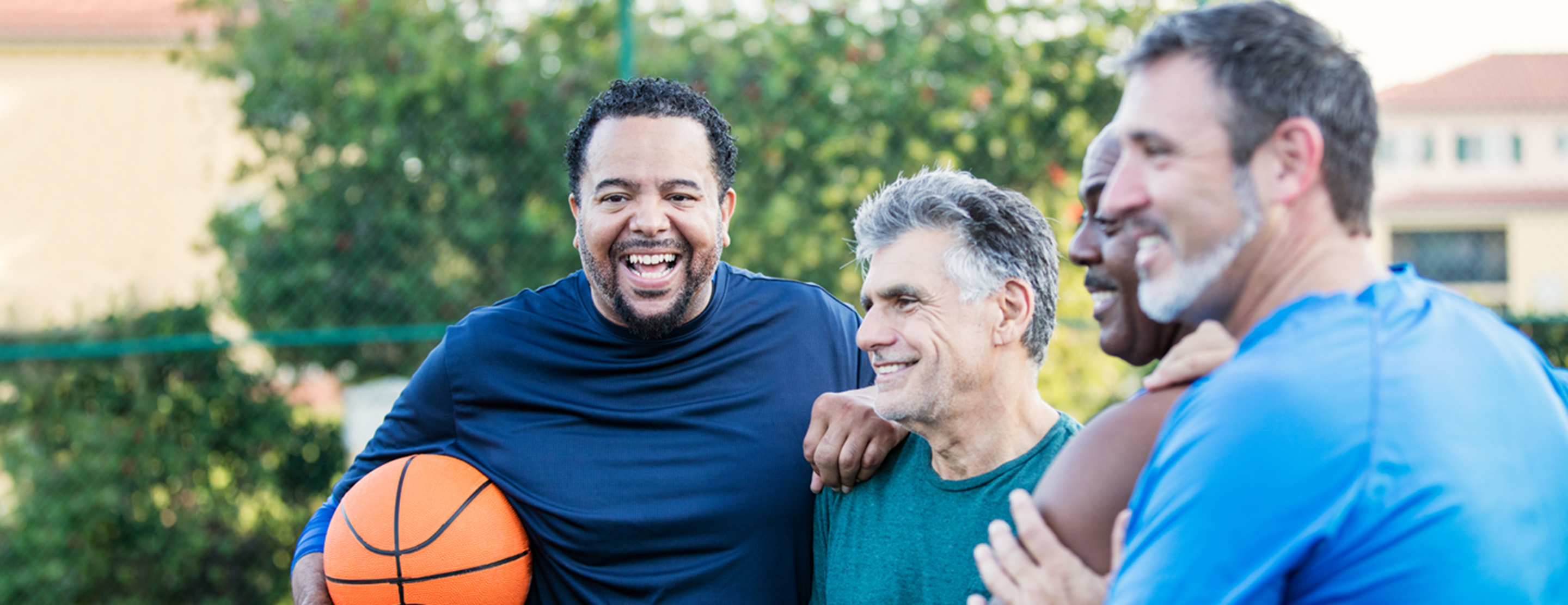Get informed
A variety of sources can provide information to help you during diagnosis, treatment and beyond, including:
- Your doctors and other members of your care team
- Books and articles
- Online resources
- Support groups
If you don't have internet access, you may be able to gain it through a shared computer at your local public library. Local cancer care centers may also provide internet access and often have staff to assist with your search. Be careful to validate any information you find on websites not associated with accredited cancer treatment facilities or endorsed by the American Cancer Society or another reputable cancer organization.
Get support
A support group can help both you and your loved ones before, during and after treatment. Studies have shown the value of support groups in aiding decision-making, enhancing quality of life and possibly even in prolonging life. Talking with other men whose prostate cancer was successfully treated can be tremendously reassuring. It can also be helpful to hear how others made treatment decisions, what their experiences were with certain treatments, and how they coped with the side effects. Support groups have these same benefits for men whose initial treatment has failed or who are dealing with a recurrence of their cancer.
Support resources include the following:
- Prostate cancer advocacy organizations, such as Zero, offer online and in-person support groups for both patients and loved ones. The local office of the American Cancer Society is a good source of information about support groups in your area.
- The UCSF Patient and Family Cancer Support Center is available to help you even if you are not a patient at UCSF. This center at the Mission Bay campus offers special events, classes and support groups, and the staff can connect you to counseling and other supportive services.
- The UCSF Prostate Cancer Support Group meets monthly and is open to patients, wives, partners, family members, friends and caregivers. Meetings are the second Tuesdays of the month, 1 - 3 p.m., telehealth format. Contact the Patient and Family Cancer Support Center at (415) 885-3693.
- The UCSF Prostate Cancer Support Group for Gay Men is open to patients and their partners. Meetings are the first and third Mondays of the month, 6 - 7:30 p.m., telehealth format. For information and availability, contact Vittorio Comelli, PsyD, (415) 203-9619.
- Peer Support, a program offered through the UCSF Patient and Family Cancer Support Center, connects cancer patients with people who have "been there." This confidential phone service is free for patients and caregivers. All are welcome, regardless of where they receive medical care. You can request peer support by emailing [email protected] or calling (415) 885-3693.
- The UCSF Symptom Management Service can provide assistance to men struggling with anxiety, depression or other symptoms related to their prostate cancer diagnosis or its treatments.
- Psycho-Oncology at the Helen Diller Family Comprehensive Cancer Center includes psychologists and psychiatrists who care deeply about the emotional needs of patients and their families as they cope with cancer and treatment.
Get second opinions
With prostate cancer, people typically have multiple treatment options, any one of which can significantly affect daily life now and in the future. When the treatment decision is complicated, it's important to fully understand each of your options.
To that end, many men seek several opinions on the best treatment course for their cancer and their life. In addition to your primary care provider, you may consult a variety of specialists, such as a urologic surgeon, radiation oncologist or medical oncologist. They may bring different perspectives to the assessment of your cancer and may offer different treatment recommendations. It's wise to prepare for a meeting with any doctor. Make a list of questions you want to ask, bring along a partner or friend, and record the discussion for future reference. The UCSF Patient and Family Cancer Support Center has a list of questions you may wish to review and bring to your office visit. And consider a second opinion on the reading of your biopsy slides.
Keep good records
It's useful to keep a complete, well-organized medical record, with copies of your laboratory work, diagnostic studies and treatment recommendations, plus treatment reports on the outcomes.
This helps you get the most out of your second opinions, deal with insurance companies, and take an active role in your treatment. Test results in particular can provide baseline data on your condition, help you monitor your treatment outcome, and alert you to the possible need to change your treatment approach. If you are not good at organizing, ask a family member or friend to help you create a system to keep track of your experience.
Involve the family
Prostate cancer affects not just the patient but his family and friends. Keeping yours informed and involving them in decision-making can benefit everyone. In some instances, the patient's wife or partner takes the more active role in getting information about the disease, arranging for and participating in medical visits, and making decisions on treatment and monitoring.
Be aware that your loved ones may be fearful about losing you but unable to express these fears directly. Studies show that the partners and family caregivers of prostate cancer patients are at increased risk for anxiety, depression and other mental health concerns. Try to keep communication channels open and discuss fears and hopes honestly. The staff of the UCSF Patient and Family Cancer Support Center can link your loved ones to supportive services.
Because having a close relative with prostate cancer can increase a man's risk for the disease, it may be appropriate to talk with adult sons and brothers about taking measures to reduce their risk. In some families, the increased risk may be related to known inherited or genetic factors. Suspicions are raised about a genetic predisposition when prostate cancer occurs in multiple family members, when the diagnosis occurs at age 60 or younger, or when there is a family history of cancer. Family members at increased risk may benefit from regular screening and risk reduction strategies.
If there's a family history of prostate cancer, patients and family members may want to consult trained genetic specialists. These experts can provide an accurate family history assessment, genetic testing for cancer predisposition genes (when appropriate), education and counseling, and can explain screening and risk reduction options. These services are available through the UCSF Cancer Genetics and Prevention Program.
Deal with sexual concerns and intimacy
Every treatment for prostate cancer has potential side effects that can affect sex drive and function – often in a significant way. Men may have to cope with the prospect and then the actuality of partial or total impotence (though this is often temporary, and there are effective treatments for it). This can create anxiety, a sense of loss and diminished self-esteem, which in turn can affect the sexual relationship with a partner. Reduced libido or anxiety about not being able to get natural erections may lead men to avoid sexual activity with their partners. But men often overestimate their partners' need for frequent sexual intercourse, as compared with other means of showing love and physical closeness. There are many ways to achieve erections when they don't occur naturally and orgasms are still very possible and satisfying without erections.
If the relationship is to remain satisfying for both people, significant changes may have to be made over time in attitudes, behavior and interactions. Partners need to be comfortable and open about expressing their desires, fears and hopes and be willing to work out any differences in a mutually respectful way. Ultimately, many men have satisfying sexual relationships after treatment. Learn more about dealing with erectile dysfunction.
Reduce stress
Dealing with a cancer diagnosis and treatment can be extremely distressing. Fortunately, there are many ways to reduce stress and anxiety. These include meditation practices (such as mindfulness meditation), modifying breathing rhythms, visualization techniques, relaxation exercises and massage. Recent research at Harvard University shows that daily meditation can lower blood pressure by increasing bloodstream levels of nitric oxide, which dilates blood vessels. Acupuncture, a treatment increasingly accepted by Western medicine, can reduce pain and certain treatment side effects. Traditional exercise systems, such as tai chi, qigong and yoga, can help people become more at ease with themselves. Classes for learning these disciplines are available in many recreation departments or hospital resource centers.
A cancer diagnosis often leads people to examine how they are living their lives, ultimately leading them to make positive changes in work, play, relationships, and personal and social practices. These changes can reduce the more stressful and negative aspects of daily life.
Keep a positive attitude
Learning more about prostate cancer and its treatments can help you develop a positive attitude. As you become informed about your options and what they mean for you, and as you talk with men who are thriving after their treatments, feelings of hope and optimism will emerge more frequently. Recognize that everyone copes differently and benefits from different types of support. Become aware of what feels most supportive to you.
Try to be with people and incorporate activities that bring you a sense of joy, peace and healing. This may mean joining a support group, spending more time with family, embracing individual counseling, varying your daily routine, setting aside special days for yourself or spending time in nature. Schedule pleasant events to boost your mood and cultivate perspective.










